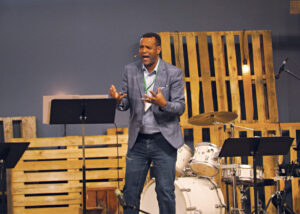One of my abiding critiques of the progressive church circles I inhabit is that they often lack what I call existential urgency. God is, we think, very interested in our positions on social issues and is very eager to affirm our journey through various constellations of identities, but God is not so much interested in sin or salvation or judgment or deliverance or the kind of love that breaks down in order to mend.
This God is not so much about anything that could set a soul aflame.
Aside from this blend of faith being flat-out boring, I also believe it is a recipe for failure.
I frequently come across articles that enumerate this point, but a recent piece called “A therapeutic church is an atheist church” caught my eye. It is written by Brad East, a noted young American writer and professor of theology at Abilene Christian University in Texas.
By “therapeutic church,” East means a church that speaks not of “sin, judgment, guilt . . . repentance, punishment, suffering, crucifixion, deliverance, salvation…” but focuses rather on matters such as “wellness, health, toxicity, self-care, harm, safety, balance, affirmation, holding space and being well-adjusted.” In short, East’s therapeutic church is a progressive church.
His article ends, ominously, thus:
“The more . . . a congregation becomes therapeutic, in its language, its liturgy, its morals, its common life, the more God recedes from the picture. God becomes secondary, then tertiary, then ornamental, then metaphorical, then finally superfluous.
‘The old-timers keep God on, mostly out of muscle memory, but the younger generations know the score. They don’t quit church and stop believing in God because of a lack of catechesis [religious instruction], as if they weren’t listening on Sundays. They were listening all right. The catechesis didn’t fail; it worked, only too well. The twenty- and thirty-somethings were preached right out of the gospel—albeit with the best of intentions and a smile on every minister and usher’s face. They smiled right back and headed for the exit sign.’ ”
A back door God
About a decade ago, I moved slightly leftward in my church affiliation. I was excited to have more theological breathing space. I was ready for a more socially engaged gospel. At about that time, I had a conversation with a seasoned veteran of the Mennonite social justice-y parachurch world. He said something that struck me: “Yeah, we’ve got more room theologically, we’re more socially engaged. . . . But I sometimes wonder where the life is.”
I puzzled about this comment at the time but filed it away. A decade later, it makes more sense.
The catechesis is too often, as East says, working only too well. You don’t necessarily need God for inclusivity training or political engagement or to affirm your uniqueness. So God is either left out or, alternatively, pressed awkwardly into the service of these ends. God can always be dragged in the back door and reduced to the smallness of our ambitions.
To be clear, a gospel that does not include a robust vision of social engagement is no gospel at all. But God is so much more than this. And, to put it bluntly, the God-as-therapist or God-as-activist-in-chief isn’t particularly working. There are blessed exceptions (thanks be to God!), but in general terms, our demographics with Mennonite Church Canada tend to be trending along the same lines as many other mainline denominations. We are a church of mostly aging white liberals, at least in many parts of the country.
God ablaze among the lost
Alongside the piece by Brad East, I read a reflection on Matthew Perry’s recent memoir, Friends, Lovers and the Big Terrible Thing. It provides an interesting contrast. I was never a huge fan of Friends—the sitcom in which Perry starred—but Perry’s harrowing story of addiction has been popping up with some regularity over the last while. I wasn’t surprised to read that when he reached rock bottom, Perry found God waiting for him there. God is where the lost things are.
I started above by noting a lack of existential urgency—that which might set the soul ablaze—in progressive faith circles; Perry provides a dramatic example of just that. He began to pray “with the desperation of a drowning man,” he writes. “God, please help me,” he whispered. “Show me that you are here. God, please help me.” He describes what happened as he prayed:
“[T]he little wave in the air transformed into a small, golden light. As I kneeled, the light slowly began to get bigger, and bigger, until it was so big that it encompassed the entire room. It was like I was standing on the sun. I had stepped on the surface of the sun. What was happening? And why was I starting to feel better? And why was I not terrified?”
Spiritual pursuit
The resulting feeling was, in Perry’s words: “more perfect than the most perfect quantity of drugs I had ever taken. . . . It was way way bigger than me. My only choice was to surrender to it….”
Perry does not describe his soul as aflame per se, but something profound had happened: “My blood hadn’t been replaced with warm honey. I was warm honey. And for the first time in my life, I was in the presence of love and acceptance and filled with an overwhelming feeling that everything was going to be okay. I knew now that my prayer had been answered. . . .”
Perry goes on to explain how for the first time in his life he felt okay, decades of struggling and pain washed away. “I had been in the presence of God,” he writes. “I was certain of it. And this time I had prayed for the right thing: help.”
The question of faith—the question that has animated anything worthy of the name “spiritual pursuit” in my own life—is whether or not this is indeed the God with which we have to deal.
Is God the one who overwhelms us when we reach rock bottom, warm like honey, thick like grace? The one who washes over us, consigning rivers of pain into oblivion? The one who is mighty to save and strong to heal? Or is God the equivalent of a kindly bureaucrat giving a diversity seminar or shepherding us toward the right political rally?
Maybe I’ve created a false dichotomy here. Probably. But God, how I hope Perry’s soulful version is the truer depiction. Actually, scratch that. I don’t “hope” it’s the truer; I would bet my life on it.
Ryan Dueck grew up on a farm in southern Alberta, not too far from Lethbridge Mennonite Church where he has served as pastor since 2011. You can find more of his writings at ryandueck.com where a version of the above article first appeared.
Response to Ryan Dueck
 Means to an end
Means to an end
I’m thankful for this article because I think a conversation about the relationship between our idea of God and current social justice issues is one the Mennonite church should have. I’m particularly struck by these lines: “God can always be dragged in the back door and reduced to the smallness of our ambitions. But God is so much more than this.”
The more I grapple with what it means to be a Christian today, as our Canadian society comes to terms with the harms that have been committed in Christianity’s name, the more I realize the incredible danger in confusing our human will and our human goals with God’s. We certainly are called by God to work for justice and peace in our world, and we must also be careful and intentional in our understanding and proclamation of God’s will in our work for peace and justice. After all, God is not a means to an end, but the end itself.
—Emma Siemens, Canadian Mennonite University student, Canadian Mennonite intern
 Woke
Woke
Pastor Dueck’s article affirms our humanistic need to soothe our fleshly desires, physically and mentally. Therapeutic churches parallel prosperity churches as both select convenient and human-centered scriptures from the Bible and exploit them for our need.
The church is undergoing an identity crisis as it is being incorporated into contemporary woke culture and, in doing so, churches have turned inward and surrendered to a false idol of self-care. Perry’s story is beautiful and simple. It is a reminder that God is a God who cares about our souls.
Throughout the Bible, Jesus heals by first attending to the needs of our souls. This is missing in our churches today: urgency and a fiery passion for God. Nowadays, churches are obsessed with being attractive and digestible, but Jesus was countercultural. How do we understand self-care and wellness through a Jesus-centered lens? For sure, Jesus cares about our physical and mental wellbeing, however he also cares deeply about our souls. How is the church standing firm as a community of believers? If there is no distinction between mainstream beliefs, political agendas, and the church, then we might as well spend our Sunday mornings at a rallies and self-help seminars.
—Christen Kong, health promoter and podcaster in Toronto
 Refiner’s fire
Refiner’s fire
I see Ryan Dueck as a nuanced thinker seeking to provoke readers with a concern that weighs heavily on his heart and mind. For me, Ryan’s A-versus-B scenario reads as a caricatured and all but clichéd categorization, expressing his deflated sense of the health and witness of the church as he experiences it. Yet he’s not only at a deflated place; he’s also reaching for a hope, calling and conviction that surely must lie elsewhere.
I get why Ryan presents his categorizations as literal church types. I also get his discouragement, but I don’t entirely share his views. Rather, I see these two types as dynamics that exist in some combination in most every congregation and denomination, albeit in varying proportions and expressed in diverging ways. More importantly, there’s a whole lot of reckoning going on in the church at this time, reckoning with what likely is understood as sin by most churches but not called that by everyone because it’s the very definitions of what is and has been considered sin and what (or who) is considered righteous that are under the refiner’s fire.
In his book The Christian Imagination, Willie James Jennings speaks of the church being confronted by and wrestling with, “perverted forms of time and communion drawn on Christian logics.” Do we—all forms of church—need to hear a call to repentance, salvation and transformation in those “perverted forms” in which our theological sensibilities are embedded? Yes. Is there one type of church that is reckoning with that call in ways categorically better than others? Likely not.
Will the story told a century from now attend as much to what happened through those who stood off to the side as much as those who stayed passionately committed. In God’s grace, likely so.
—Cheryl Pauls, president, Canadian Mennonite University
 Gentleness
Gentleness
“Maybe I’ve created a false dichotomy here. Probably,” Dueck says at the end of his essay. But I don’t think Ryan has created a false dichotomy so much as illuminated one many of us find ourselves living inside.
Most of us in North American Christianity have been formed in the binary tensions between faith and works, judgment and love, salvation as everlasting life and salvation as justice, Jesus as Lion and Jesus as Lamb. We pendulum-swing between them as individuals and as generations, although often we continue to be deeply affected even by the side we reject. So those of us who grew up in legalistic fundamentalisms may find ourselves taking the same legalism into progressive activist spaces, still politely sidestepping the radical disruptions of grace.
But the most vibrant faith I have encountered rejects the dichotomies: it holds them together in a provocative both/and. This faith is unabashedly delighted by God’s mercy, and it is passionately committed to justice, which it recognizes as love writ large. It is earthy and practical and at the same time rooted in spiritual disciplines like contemplative prayer. It is honest about human failings—sin, both personal and structural—because it usually emerges from a familiarity with hardship. It is gracious and non-defensive and the opposite of coercive, but it also says, Listen, I have known the depths, and I have met Jesus on the road, and my heart burned within me. This is my story.
Why do we find it so hard to follow in this way beyond dichotomies, as individuals and faith communities? I think we are up against many challenges. In the twenty-first-century Global North, we are so often bundled up in comforts—digital and otherwise—that lull us out of contact with our own inner lives and the world’s desperation.
We also live in what philosopher Charles Taylor calls the “immanent frame,” where most people assume this material world to be all there is. To claim contact with transcendence is to go against the prevailing norm, and so we are often embarrassed to admit to believing in something more. We’re also embarrassed because many who claim transcendence most loudly in our day and age are noisily supremacist and exclusionary. Given the violence of imperial Christianity, we are right to worry about triumphalism.
But if we swing away from these risks so fully that we abandon the possibility of the Spirit of Jesus active among us, surprising us, comforting and convicting and transforming us, what are we left with?
Dueck cites Matthew Perry’s story as a vivid example of the kind of divine meeting that disrupts our tidy expectations and dichotomies, and I’m not the least bit surprised, because so many of the most impassioned stories of conversion in contemporary North American contexts emerge out of addiction: in Anne Lamott’s famously expletive-laden prayer at rock bottom, she met Jesus. The poet Mary Karr tells a similar story of encounter in her memoir Lit.
These experiences hearken back to other mystical encounters: Julian of Norwich’s fourteenth-century vision of Jesus on her deathbed, which rescued and fully changed her life; the philosopher Simone Weil’s unexpected visit from Jesus in the midst of a terrible migraine, which pulled her out of agnosticism into a passionate belief and daily prayer practice that only energized her political work.
The mystical-political tradition is rich and ongoing. A decade and a half ago, as I grappled with the harms I’d seen Christianity do in my own networks of friendship as well as in my study of history, I met this passion not just in Weil’s writing but also in liberation theologies emerging out of unspeakable conditions of colonization and oppression: in the writings of Gustavo Gutiérrez, Mercy Amba Oduyoye, Delores Williams, James Cone, and Emilie Townes.
I met it in novels like Ana Castillo’s So Far from God and Louise Erdrich’s The Last Report on the Miracles at Little No Horse and Chimamanda Adichie’s Purple Hibiscus, which are unabashedly critical of the damages Christian institutions have wrought yet also emboldened by Christianity’s mystical power and spiritual subversion of the powers.
My own most profound encounters with Jesus have been in my moments of deepest need. Six years ago, we handed over a tiny baby Pilgram for major emergency eye surgery. In my grief and fear as I wept in the Edmonton hospital hallway, I felt the abiding presence of the Spirit of God, like a pool of water at the base of my worried soul, and I knew in that moment we were being upheld by prayers around the world.
At Pilgram’s second surgery, I unwrapped a homemade granola bar our friend Crystal had sent and tasted the sweetness of divine accompaniment—we encounter God in both the mystery of the Spirit’s felt presence and in the gift of honeyed oats. We meet God in our need, our own limits, in the admission that the world hurts us and we hurt each other and we hurt ourselves and in all of these failings we desperately need both good-faith human effort to repair and supernatural grace. There’s nothing polite about this need. I know it, deep down, as I look at the world’s enormous injustices, and I know it when I make the time to be still and take a look inside myself.
This is the faith I dearly want us to see as possible: a faith that seeks to worship our Creator in the Way of Jesus, who in the mystery of the Incarnation shows us the both/and of immanence and transcendence, matter and spirit, grace and works, lament and laughter, humility and power, sacrifice and comfort. I want to share this faith with my children and with the little church that meets weekly in my house, the sweetness of the bread and juice signalling to us the goodness of a God who is at once with us and within us and beyond us.
I want us to hold this faith with a certain gentleness, because we have inherited a chastened tradition whose harms we must repent of even as we learn from its mercies. And I want us to remember that when we believe in the existence of more-than-just-matter, we break with the immanent frame that most immediately surrounds us but are in communion with the vast majority of the world, whose inhabitants still sense in their deep-down knowing that this world isn’t all there is.
I want us to know that we are made of dirt and filled with divine breath, and that this is a profound mystery that we carry with wonder: God is love. We are loved. We were made to love. It sounds pretty, even naïve, but in truth it changes everything. This love is the realest Real there is. Sometimes it breaks in and catches us unawares, but always it’s there moving and acting, just beyond the frame.
—Cynthia Wallace, associate professor, St. Thomas More College, University of Saskatchewan
 Soul Aflame
Soul Aflame
Is there no spark within this faith
No glowing ember beneath the warm layer of habit?
Has not my soul burned within me,
As you spoke on this road,
As you opened this world –
its beauty, its sorrow, its humming growth –
to my understanding?
I remember
When my soul but flickered
In grimmest loneliness
In deepest grief
In the most uncertain of uncertainties and most hopeless of hopelessnesses
It was coldest, then,
And if I had ever believed I could see by my own light,
I learned a new lesson from the darkness.
For there you were –
Pillar of fire crossing wilderness to guide me.
Blazing bush with my name in your voice,
The voice of thunder, of whirlwinds, and of Do not be afraid.
And there I slipped off my shoes, afraid still, but desperate to keep warm.
My soul aflame with unseen hope,
O Seeker of stray lambs,
if only just enough to light tomorrow.
I remember
The phone rang
And a Thursday morning, wide open with promise,
Became instead another graveyard for another queer child.
Death by love-the-sinner-hate-the-sin
By a thousand small cuts
Until hope was broken.
And I roared my prayer of protest.
My soul aflame with rage,
O crucified One,
With roars like the rending of your own heavens.
Dampen not these flames
But stoke them with a love as strong as death, and stronger still,
A raging flame fierce as a grave that comes too soon
For walking through it I shall not be burned, but refined
As my soul burns within me,
As you speak on this road,
As you open this world,
As you set all our souls aflame –
With promise that kindles hope
With mercy that ignites transformation
With solidarity that withers oppression
With love that illuminates your reign coming.
Our souls aflame with you,
O Holy One,
And all the flashes of the raging flame of your great love.
—Alissa Bender is pastor of Hamilton Mennonite Church.








Leave a Reply
You must be logged in to post a comment.